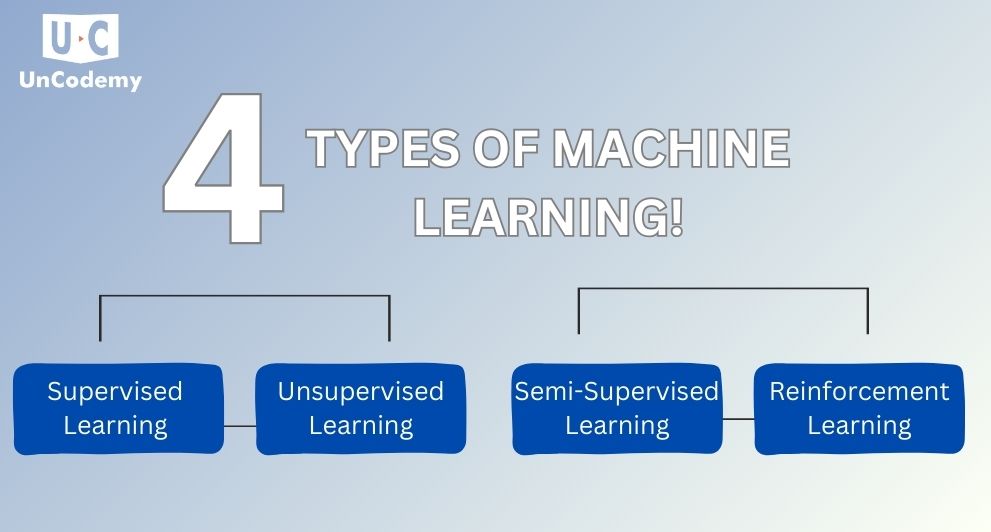What Are the Important Topics in Machine Learning?

- ai
- Computer Vision
- Deep Learning
- Feature Engineering
- machine learning
- Model Evaluation
- NLP
- Reinforcement Learning
- Supervised Learning
What Is Machine Learning?
“Machine learning is not just about algorithms; it’s about learning patterns, behaviors, and making informed decisions,” as experts often say. At its core, ML is a branch of artificial intelligence that enables computers to learn from data without being explicitly programmed.
Types of Machine Learning

- Supervised Learning
Imagine you’re teaching a toddler to differentiate between apples and bananas. You provide labeled examples (“This is an apple,” “This is a banana”). That’s supervised learning in action!
- Applications: Email spam detection, loan prediction, and sentiment analysis.
- Algorithms to Explore: Linear Regression, Logistic Regression, Decision Trees, Random Forests.
- Unsupervised Learning
Now, imagine handing the toddler a fruit basket and asking them to group similar fruits. Here, no labels are provided—just data.
- Applications: Customer segmentation, anomaly detection, and market basket analysis.
- Algorithms to Explore: K-Means Clustering, PCA (Principal Component Analysis), DBSCAN.
- Semi-Supervised Learning
Think of this as a blend of the first two. You provide a few labeled examples and leave the rest for the model to figure out.
- Applications: Fraud detection, disease diagnosis.
- Reinforcement Learning
Picture training a dog to fetch. The dog learns through rewards and punishments. Similarly, reinforcement learning involves learning through trial and error to maximize rewards.
- Applications: Game AI (like AlphaGo), robotics, and dynamic pricing.
- Algorithms to Explore: Q-Learning, Deep Q-Networks.
Core Topics in Machine Learning
Here are the essential topics to focus on:
- Data Preprocessing
“Garbage in, garbage out” holds true for ML. Preprocessing involves cleaning, normalizing, and preparing data for analysis.
- Key Techniques: Handling missing data, feature scaling, encoding categorical variables.
- Resources: Learn Data Preprocessing
- Feature Selection and Engineering
Features are the building blocks of ML models. Selecting the right ones or creating new features can significantly impact performance.
- Key Concepts: Feature importance, dimensionality reduction (PCA, t-SNE).
- Model Selection and Evaluation
Choosing the right model isn’t a one-size-fits-all approach.
- Evaluation Metrics: Accuracy, precision, recall, F1-score, ROC-AUC.
- Tip: Always perform cross-validation to ensure your model is robust.
- Neural Networks and Deep Learning
Dive into the world of neural networks if you’re keen on image recognition or natural language processing (NLP).
- Key Concepts: Backpropagation, convolutional neural networks (CNNs), recurrent neural networks (RNNs).
- Famous Frameworks: TensorFlow, PyTorch.
- Natural Language Processing (NLP)
Ever wondered how Siri understands you? NLP focuses on enabling machines to interpret human language.
- Key Techniques: Tokenization, sentiment analysis, named entity recognition.
- Applications: Chatbots, voice recognition.
- Computer Vision
ML meets vision here! From facial recognition to medical imaging, this field is exploding.
- Key Algorithms: CNNs, YOLO (You Only Look Once).
- Applications: Autonomous vehicles, augmented reality.
- Model Deployment
Building a model is only half the battle; deploying it for real-world use is where the magic happens.
- Key Tools: Flask, Docker, cloud services (AWS, Google Cloud).
Why Is Understanding the Types of Machine Learning Important?
Knowing the type of machine learning required for a problem is like choosing the right tool for the job. Without this understanding, even the best algorithms may fall flat.
“An investment in knowledge pays the best interest.” – Benjamin Franklin.
So, invest your time in learning these types thoroughly, and you’ll reap the rewards.
Tips to Excel in Machine Learning
- Start Small, Dream Big: Begin with simple datasets and gradually take on more complex projects.
- Join a Community: Platforms like Kaggle are treasure troves of resources and competitions.
- Practice, Practice, Practice: ML is a hands-on field. The more you code, the better you get.
- Stay Curious: Follow blogs, research papers, and courses to keep up with trends.
Conclusion
Machine learning isn’t just a subject; it’s a journey of discovery. By focusing on the important topics in machine learning, such as understanding data, selecting the right algorithms, and interpreting results, you set yourself on a path to success.
So, what are you waiting for? Jump into this exciting field and let your curiosity lead the way. Remember, “Success doesn’t come to you; you go to it!



























